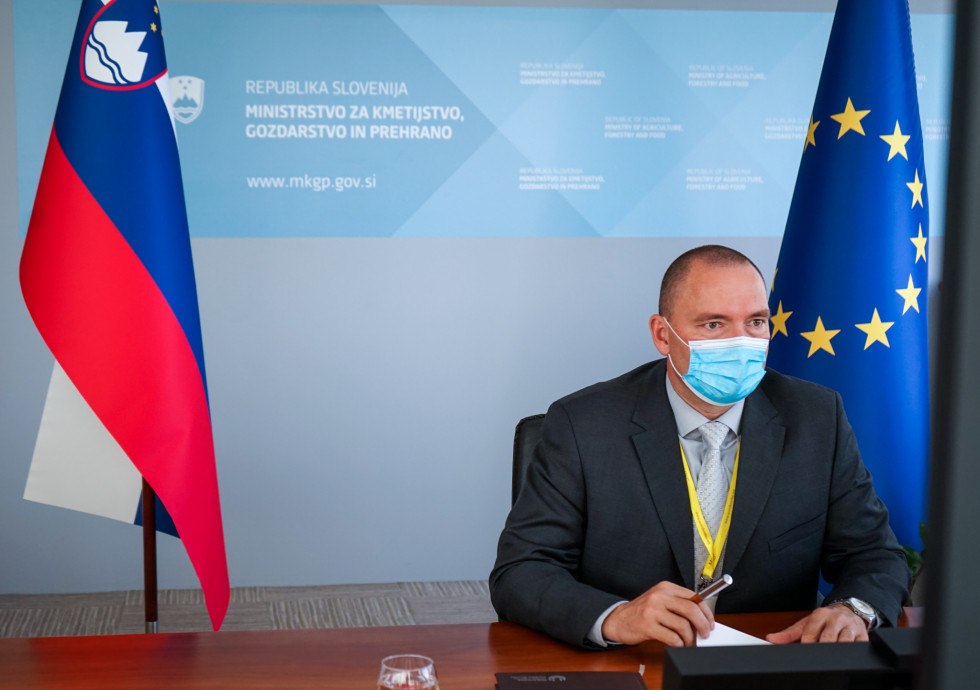By: UKOM
At the invitation of the Minister of Agriculture and Rural Development of the Republic of Poland, Mr Grzegorz Puda, Minister Jože Podgoršek (in the first part) and State Secretary Aleš Irgolič (in the second part) have attended the meeting of the Ministers of Agriculture of the Visegrad Group extended to Slovenia, Bulgaria, Croatia and Romania (V4+4), which was held by videoconference. The Ministers have discussed the challenges and opportunities for agricultural holdings in light of the Farm to Fork Strategy and exchanged experience in the preparation of strategic plans for the Common Agricultural Policy.
During the discussion held at the conference, Slovenia referred to its official position on the Farm to Fork Strategy. “We believe that the Farm to Fork Strategy is the right path for the transition of agriculture. Agriculture must continue to provide safe, quality and accessible food and, at the same time, act responsibly towards natural resources. The transition to a nature-friendly food system is a major challenge. This is particularly true for the balance between the primary task of agriculture, which is to provide quality and healthy food, and the legitimate expectations of the society about the lower use of pesticides and fertilizers, the reduction of food waste and waste, better animal welfare, lower carbon footprint, and greater emphasis on healthy and nutritious food. Slovenia believes that it is necessary to address the areas highlighted in the Strategy. However, we note that the key commitments in the strategy are very ambitious and represent a major challenge for agriculture in Slovenia,” Minister Podgoršek pointed out in the discussion. In this regard, it is necessary to clearly recognise the importance of a fair transition to a sustainable food system. The European Commission must take into account the special characteristics and particularities of each Member State and different baseline situations and possibilities for improving food systems in Member States when planning the transition.
The Ministers of Agriculture of V4, Bulgaria, Croatia and Romania signed a Joint Declaration in the first part of the meeting. In view of the upcoming Slovenian Presidency of the Council of the EU, Slovenia will not be among the signatories of the Declaration on this occasion
State Secretary Aleš Irgolič attended the second part of the meeting, during which the participants exchanged experience in the preparation of strategic plans for the Common Agricultural Policy (CAP). The preparation of the strategic plan is the main change brought about by the CAP reform. This delivery model or the strategic planning of Member States, which will have to prepare a strategic plan for the implementation of CAP, has to include the measures of the first pillar (direct payments, sectoral measures, e.g. for beekeeping and for the wine sector) and the second pillar (Rural Development Programme). Mr Irgolič pointed out: “As regards the implementation of the Commission’s recommendations, our strategic plan will take into account the special characteristics of our country and the potential and reasonable prospects of achieving the commitments and goals of the Strategy. This will ensure a balanced and fair contribution of each Member State, taking into account the different methods of food production and their development stage. It will also help them to adjust to sustainable systems of food production. In order to promote sustainable agriculture, the strategic plan will focus on the interventions for the mitigation of and adaptation to climate change, the protection of natural resources and the conservation and restoration of biodiversity, provided that we also maintain the competitiveness of agriculture. We will seek balance between the need for food production, the protection of the environment and the development of rural areas. We closely cooperate with stakeholders from the fields of agriculture and nature protection to find balance and put forward acceptable proposals.”
In close cooperation with stakeholders, Slovenia prepared the first draft of the strategic plan in December last year. This year, it will prepare the final set of interventions together with stakeholders and the general public, taking into account the available financial resources, priorities, objectives and the expected results. Slovenia plans to officially submit the strategic plan for the approval of the European Commission by the end of this year. During the Slovenian Presidency of the Council of the EU, a workshop or a discussion on the preparation of national strategic plans will be organised to help Member States in the process.

